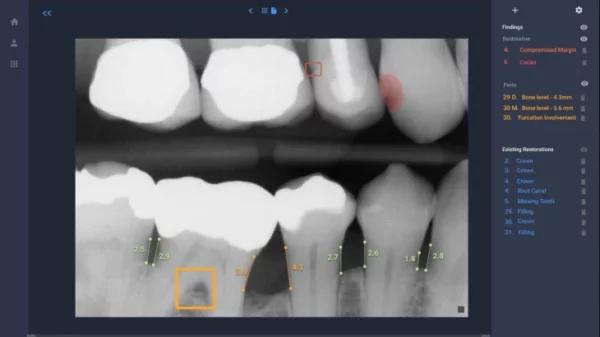News
Overjet sinks its teeth into another round of capital for its dental AI tech

Image Credits: Overjet/PR Newswire / Overjet’s Clinical Intelligence Platform displays a radiograph with dental artificial intelligence findings.
Just four months after announcing $27 million in Series A funding, Overjet, a company developing dental artificial intelligence software, came forward again with another $42.5 million in Series B financing backed by existing investors.
Prior to the company’s Series A, we profiled them in 2020 when the company raised $7.85 million in funding. The latest funding was led by General Catalyst and Insight Partners and included Crosslink Capital and E14 Fund. Overall, the company has raised just under $80 million in total. Now even more well capitalized, Overjet’s valuation has nearly quadrupled to $425 million, says Wardah Inam, PhD, co-founder and CEO of Overjet.
“We were valued at $115 million at the last round, so this is a substantial increase,” she added. “For a dental company, not many have reached that milestone yet.”
Having just completed a round of funding, Inam told TechCrunch that it was a quick Series B, and though the timing was unexpected, it was the result of much inbound inquiries from investors. New investors showed interest, but the company decided to do the round internally when it was able to get the terms it wanted for the future, she said.
Boston-based Overjet’s dental AI software supports dentists in understanding what the scans show with regard to disease identification and progression. Its Dental Assist product has FDA clearance and its strategy of targeting dental groups with large numbers of providers, for example its partnership with 50-clinic New England Family Dentistry, announced in October, is keeping the company busy working to implement its software into thousands of practices, Inam said.
On the insurance side, the company counts 16 major carriers as customers. It was covering 50 million members at the time of the Series A, and that figure is now around 75 million, Inam said.
“The raise was to set up practice operations, and now that we have good hires in, we have a huge backlog of practices that we want to launch,” she added. “Milestones that we were planning to hit in a year, we ended up hitting in a few months.”
In December, Overjet reached 50 employees after starting the year with 20, and Inam expects to triple that headcount in the next six months in the areas of customer success and engineering. It switched to remote-first operations so it could reach a broader range of talent. The company also plans to use the new funding to develop new products.
Next up, the company remains on course with its focus on improving oral health and oral care and building technology. Inam believes that “for the first time ever” the technology is there to analyze dental data through computers and be able to more accurately see the progression of disease and measure outcomes toward more value-based care.
Meanwhile, the dental industry is one that has been slow to embrace technology, but many startups have emerged in the past decade to assist payers and providers in automating some of the traditionally manual parts of the business, particularly the clear aligner space and analyzing dental scans, and educating people about dental health.
This year, companies like Adra, which is turning X-rays into images for better identification of problems, also received funding, as did dental insurer Beam Dental.
“Dental practices are fast being run more like businesses and they are ready to pay for technology and other tools to help them improve care and revenue,” Inam said. “That’s why more and more good startups are being formed in this space, because everyone underestimates the value of oral health, but now there is an opportunity to really provide greater technology.”




